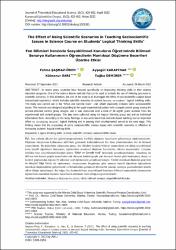| dc.contributor.author | Karapınar, Ayşegül | |
| dc.contributor.author | Şaşmazören, Fatma | |
| dc.contributor.author | Sarı, Kübranur | |
| dc.contributor.author | Demirer, Tuğba | |
| dc.date.accessioned | 2023-09-14T10:01:37Z | |
| dc.date.available | 2023-09-14T10:01:37Z | |
| dc.date.issued | 22.04.2022 | en_US |
| dc.identifier.citation | Şaşmazören, F. , Karapınar, A. , Sarı, K. & Demirer, T. (2022). The Effect of Using Scientific Scenarios in Teaching Socioscientific Issues in Science Course on Students' Logical Thinking Skills . Journal of Theoretical Educational Science , 15 (2) , 420-452 . DOI: 10.30831/akukeg.1001361 | en_US |
| dc.identifier.issn | 1308-1659 | |
| dc.identifier.uri | https://dergipark.org.tr/tr/pub/akukeg/issue/68991/1001361 | |
| dc.identifier.uri | https://hdl.handle.net/11630/11014 | |
| dc.description.abstract | In recent years, countries have focused specifically on improving thinking skills in their science education programs. One of the science lesson methods that can be used to activate the use of thinking processes is scientific scenarios. Therefore, the study aim is to investigate the effect of the use of scientific scenarios in the science course on students' logical thinking skills. The study was carried out in the 'DNA and genetic code' unit, which especially includes some socioscientific issues. The research was designed according to the quasi-experimental pattern with unequal control group among the pretest-posttest control group designs, and it was conducted with a total of 36 eighth grade students from the experimental and control groups. The data were collected using the logical thinking group test and an individual information form. According to the study findings, it was understood that scenario-based teaching had an important effect on developing students' logical thinking and in passing their developmental period to the next stage. This finding shows that the processing of some socioscientific science topics with scientific scenarios is effective in increasing students' logical thinking skills. In line with these results obtained from the study, conclusions have been made regarding the use of scientific scenarios. | en_US |
| dc.description.abstract | Son yıllarda ülkeler fen eğitimi programlarında özellikle düşünme becerilerini geliştirmeye odaklanmışlardır.
Düşünme süreçlerinin kullanımını aktif hale getirmede kullanılabilecek fen dersi yöntemlerinden biri de bilimsel
senaryolardır. Bu doğrultuda çalışmanın amacı, fen bilimleri dersinde bilimsel senaryoların yer aldığı sosyobilimsel
konu temelli öğretimsel deneyimin, öğrencilerin mantıksal düşünme becerilerine etkisini araştırmaktır. Çalışma,
özellikle bazı sosyobilimsel konuları içeren “DNA ve Genetik Kod” ünitesinde gerçekleştirilmiştir. Araştırma, ön
test-son test kontrol gruplu desenlerden eşit olmayan kontrol gruplu yarı deneysel desene göre tasarlanmış, deney ve
kontrol gruplarından toplam 36 sekizinci sınıf öğrencisiyle gerçekleştirilmiştir. Veriler mantıksal düşünme grup testi
ve bireysel bilgi formu ile toplanmıştır. Araştırmanın bulgularına göre senaryo temelli öğretimin öğrencilerin
mantıksal düşünmelerini geliştirmede ve bulundukları gelişimsel dönemi bir sonraki aşamaya geçirmelerinde önemli
etkisi olduğu anlaşılmıştır. Bu bulgu, fen dersindeki bazı sosyobilimsel konuların bilimsel senaryolarla işlenmesinin
öğrencilerin mantıksal düşünme becerilerini artırmada etkili olduğunu göstermektedir | en_US |
| dc.language.iso | eng | en_US |
| dc.publisher | Afyon Kocatepe Üniversitesi | en_US |
| dc.identifier.doi | 10.30831/akukeg.1001361 | en_US |
| dc.rights | info:eu-repo/semantics/openAccess | en_US |
| dc.subject | Logical Thinking Skills | en_US |
| dc.subject | Science | en_US |
| dc.subject | Scientific Scenario | en_US |
| dc.subject | Socioscientific İssues | en_US |
| dc.subject | Mantıksal Düşünme Becerileri | en_US |
| dc.subject | Bilim | en_US |
| dc.subject | Bilimsel Senaryo | en_US |
| dc.subject | Sosyobilimsel Konular | en_US |
| dc.title | The effect of using scientific scenarios in teaching socioscientific ıssues in science course on students' logical thinking skills | en_US |
| dc.title.alternative | Fen bilimleri dersinde sosyobilimsel konuların öğretiminde bilimsel senaryo kullanımının öğrencilerin mantıksal düşünme becerileri üzerine etkisi | en_US |
| dc.type | article | en_US |
| dc.relation.journal | Kuramsal Eğitimbilim Dergisi | en_US |
| dc.department | Seçiniz | en_US |
| dc.authorid | 0000-0002-8501-289X | en_US |
| dc.authorid | 0000-0002-4015-9978 | en_US |
| dc.authorid | 0000-0003-0372-033X | en_US |
| dc.authorid | 0000-0002-3460-5185 | en_US |
| dc.identifier.volume | 15 | en_US |
| dc.identifier.startpage | 420 | en_US |
| dc.identifier.endpage | 452 | en_US |
| dc.identifier.issue | 2 | en_US |
| dc.relation.publicationcategory | Makale - Ulusal Hakemli Dergi - Başka Kurum Yazarı | en_US |



















